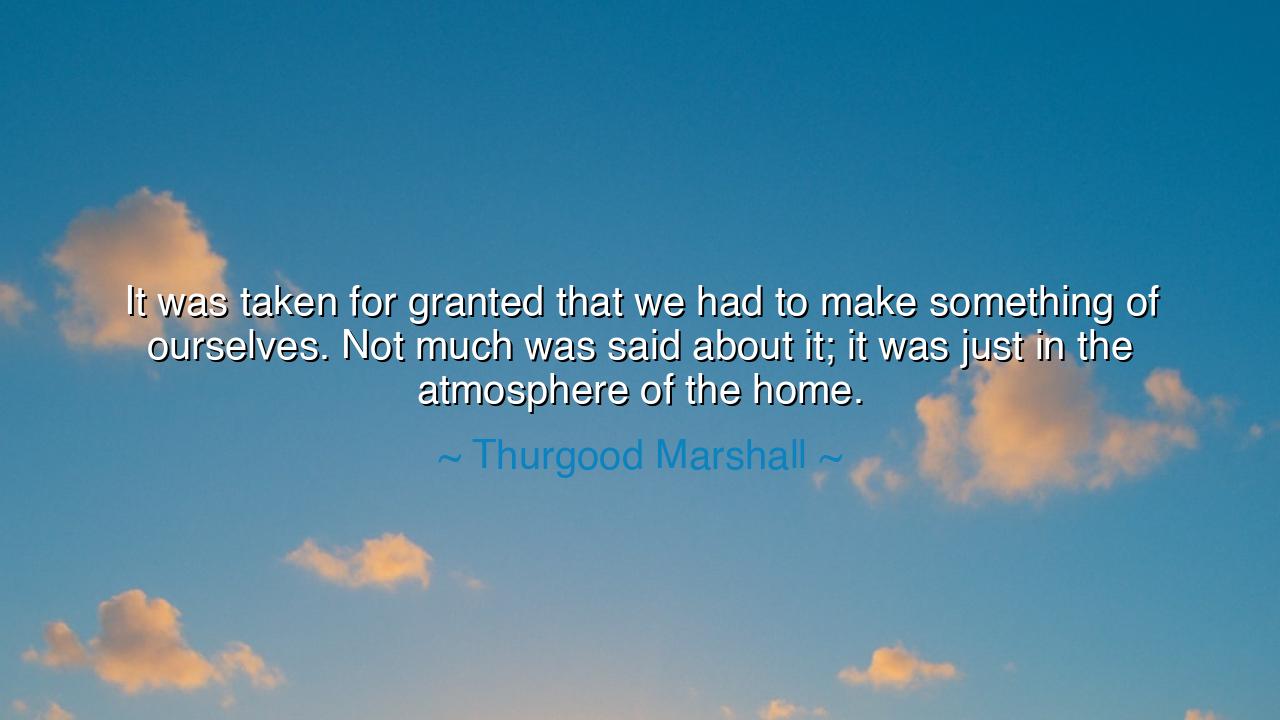
It was taken for granted that we had to make something of
It was taken for granted that we had to make something of ourselves. Not much was said about it; it was just in the atmosphere of the home.






In the calm and steadfast words of Thurgood Marshall, one of the great architects of justice in the modern age, we find a wisdom rooted in quiet strength and sacred discipline: “It was taken for granted that we had to make something of ourselves. Not much was said about it; it was just in the atmosphere of the home.” These words speak not of commandment, but of inheritance—of the unseen forces that shape the soul long before the world takes notice. For Marshall, who would rise from the humblest beginnings to become the first Black Justice of the United States Supreme Court, this atmosphere was not one of luxury or entitlement, but of duty, dignity, and belief in self-determination. It was not proclaimed from the rooftops, but breathed, lived, and passed down through the sacred air of family and community.
Thurgood Marshall, born in Baltimore in 1908, grew up in an America still divided by the walls of segregation. Yet within the walls of his own home, a different law prevailed. His parents—ordinary people by the world’s measure—filled the house with the quiet expectation that one’s life must mean something, that to be born was to carry a purpose. There was no need for lectures or long exhortations; the example of their labor, their pride, and their faith spoke louder than any sermon. This is the heart of his words: that true guidance does not always thunder, but hums constantly, like music in the background of a child’s soul. In that unseen influence lies the making of greatness.
To say “it was taken for granted” is to reveal a truth of powerful simplicity—that when excellence and character are woven naturally into daily life, they cease to be goals and become the air one breathes. In Marshall’s home, there was no room for despair or complaint, though the world outside offered plenty of both. Instead, there was the steady rhythm of expectation: you must learn, you must rise, you must build. This was the quiet faith of generations who had endured suffering but refused to be defined by it. They believed that education and effort were sacred acts, that to make something of oneself was not mere ambition, but service—to one’s family, one’s people, and to God.
History shows that such an atmosphere, though invisible, creates giants. When Thurgood Marshall stood before the Supreme Court to argue Brown v. Board of Education in 1954, he was not only armed with legal skill—he was carried by the spirit of his upbringing. The belief “that we had to make something of ourselves” was not his alone; it was the echo of countless homes like his across America, where parents who had been denied opportunity taught their children to seize it. The victory of Brown, which struck down the lie of segregation in education, was the flowering of that invisible seed—the fulfillment of a thousand quiet atmospheres where hope had been quietly cultivated.
There is ancient wisdom in this truth. The Romans said that virtue is not taught but caught—that the child who grows among the just will grow into justice, not because he was told, but because he breathed it in. Likewise, in the households of the wise, expectation becomes nourishment. The lessons that endure are those lived before the eyes of the young: the father who labors without complaint, the mother who carries herself with dignity, the community that holds fast to its moral compass despite adversity. Such examples, though unspoken, build an unbreakable foundation within the heart.
And yet, this lesson reaches beyond Marshall’s time and circumstance. In our own age—an age loud with distraction and shallow in conviction—his words call us back to substance. They remind us that what we take for granted within our homes will shape the destiny of our children. If we breathe cynicism, they will inherit despair; if we breathe purpose, they will inherit strength. To make something of oneself, as Marshall knew, begins not in wealth or privilege, but in the ethos of a household, in the belief that every person bears the power to contribute, to rise, to serve.
So, children of tomorrow, learn from this ancient truth disguised in modern speech: build homes where duty is natural, respect is lived, and purpose is expected. Speak less of success, and live more of it. Let your daily example be the silent law that governs the hearts of those who follow you. For as Thurgood Marshall teaches, greatness is not commanded into being—it is cultivated through the air we breathe, through the unseen rhythm of a home where the spirit whispers, You were born to make something of yourself. And when that belief takes root in the soul, no injustice, no hardship, and no doubt can stand in its way.






AAdministratorAdministrator
Welcome, honored guests. Please leave a comment, we will respond soon